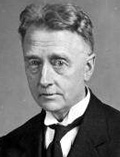Educated at local Christian Brothers School, Cosgrave shared his father's keen interest in local and national politics and attended the first Sinn Féin convention in 1905. He established a Sinn Féin branch in Dublin and was elected to the Dublin Corporation in 1909. Cosgrave joined the Irish Volunteers on their formation in 1913. In the 1916 Rising he served at the South Dublin Union under Eamon Ceannt and was sentenced to death. The sentence was commuted to penal servitude for life, and he was interned at Frongoch in Wales until January 1917, when he was released under the general amnesty. He was elected Sinn Féin MP for Kilkenny at a by-election, and reelected in the 1918 General Election. Cosgrave served as a member of the first Dáil Éireann and Minister for Local Government (2 Apr 1919 - 9 Sep 1922), with the task of organising a policy of non-cooperation with the British authorities and establishing an alternative system. He supported the 1921 Anglo-Irish Treaty and was approved as a member of the Provisional Government by the Parliament of Southern Ireland on 14 Jan 1922. Cosgrave was appointed Acting Chairman of the Provisional Government to act for Michael Collins who became Commander-in-Chief (12 Jul 1922). Following the death of Collins in action, Cosgrave was appointed Chairman at the meeting of the Provisional Government on 25 Aug 1922 and again, more formally, in a resolution dealing with the general reallocation of ministerial posts, adopted at the meeting of 30 Aug 1922. When the 3rd Dáil convened on 9 Sep 1922, Cosgrave was also appointed President of Dáil Éireann in addition to his duties as Chairman of the Provisional Government. The dual government existed until 6 Dec 1922, when the Irish Free State came into being. After the enactment of the Irish Free State Constitution in October 1922 Cosgrave was appointed (6 Dec 1922) President of the Executive Council. He served also for short periods as Minister for Finance and as Minister for Defense in 1924, when a threatened army mutiny created a crisis. In April 1923, with the end of the Civil War in sight, he was elected as the first leader of Cumann na nGaedheal, the first political party to be founded post-independence. The foundation of an unarmed civic police force, An Garda Siochana, and the creation of a National Army loyal to the State were key steps in the creation of a stable democracy. Through the 1927 Electoral Amendment Act, Cosgrave succeeded in persuading the majority of those who opposed the Treaty to reject militarism in favor of parliamentary democracy. In the face of a number of major setbacks such as the assassination of Kevin O'Higgins and the mass unemployment of the "Great Depression" Cosgrave continued to provide the strong and stable Government. Amidst great tension, Cosgrave played a major role in the peaceful transfer of power to Fianna Fáil in 1932. He became leader of the opposition in Dáil Éireann until his retirement from politics in 1945.
Biography source: [2][3] |

